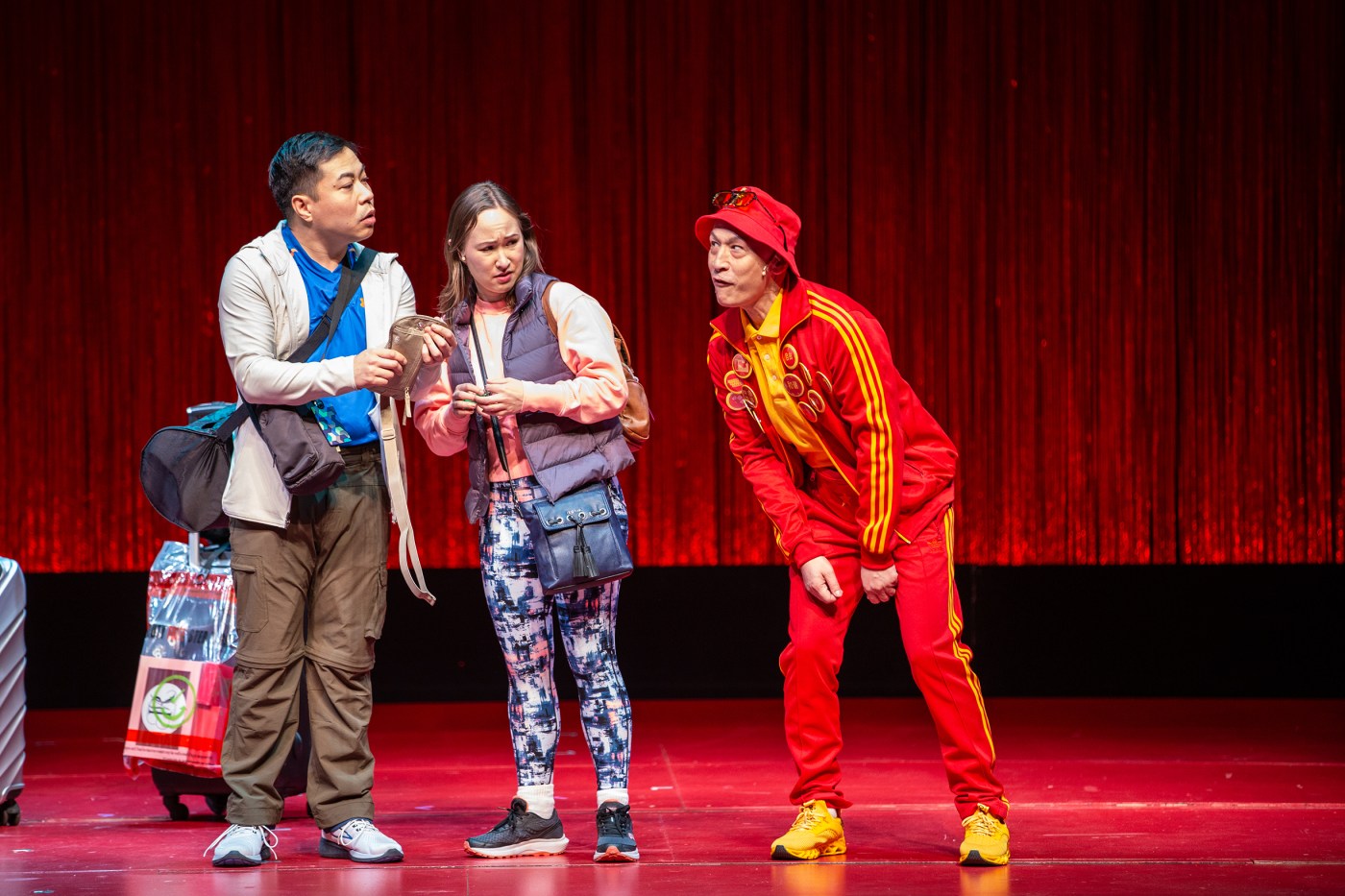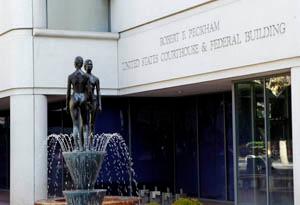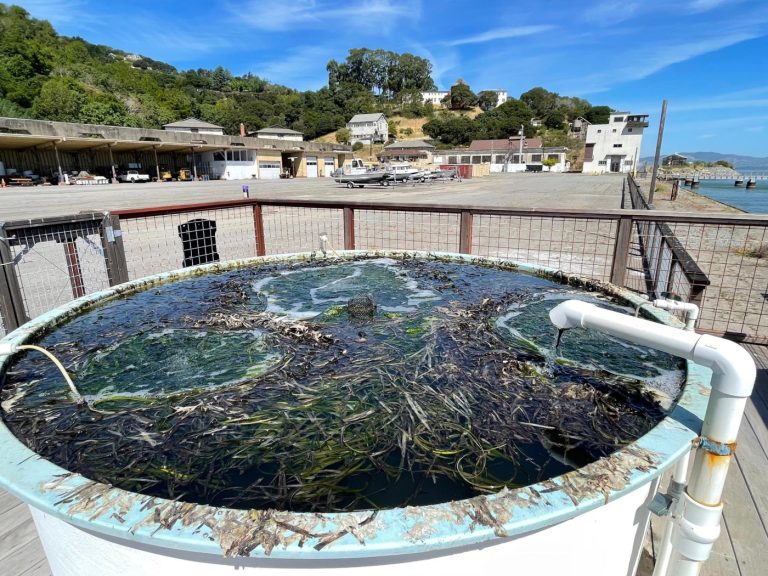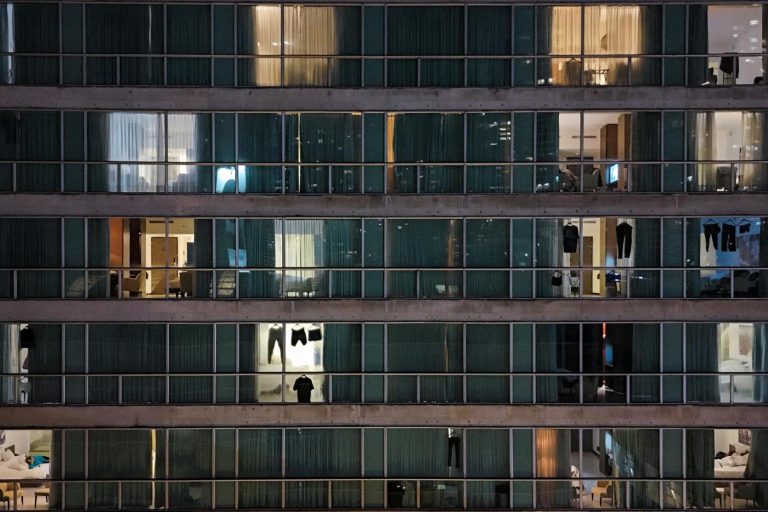In the delightful, interrogating production of “Tiger Style” at TheatreWorks Silicon Valley, there is an ebullient scene where Chinese siblings Albert and Jennifer must play a sonata to perfection, a massive litmus test in homage to their demanding parents. Within those celestial heights they reach as each crafted note expresses warm, dulcet tones, we feel their souls replete with anxiety flutter towards extinction.
In this riotous, satirical comedy, where comic, physical exertion rules the day, why does this scene stand alone in its effective pulchritude? Playwright Mike Lew’s narrative, one that seamlessly glides between humor and pathos, holds firm in its commitment to cracking an audience up while making them ponder the play’s many insightful morsels.
Director Jeffrey Lo’s skillful and nimble direction places the audience on a massive, bare stage that utilizes sly touches from scenic designer Arnel Sancianco. The story unfolds on the deck’s deep shade of red, with the proscenium doubling as the icon of Asian American grocery products, the omnipresent and awesome 99 Ranch Market.
Albert (Will Dao) and Jennifer (Jenny Nguyen Nelson) are low-key failures, bopping around life trying to cling to the pathetic folks who keep their company. Jennifer is a doctor and former concert pianist whose romantic partner is commitment-phobic moocher Reggie (Jeremy Kahn). Albert isn’t faring much better, passed over in a promotion at his company by Russ the Bus (Kahn), a mouth-breathing imbecile whose University of Phoenix degree is a major flex over Albert’s degree, from a small private college named Harvard.
So why do these Ivy League siblings, who double as roommates, have such a poor disposition despite their credentials? There is only one possible answer – their tiger parents, Dad (Francis Jue) and Mom (Emily Kuroda), who threw them into every advantageous activity they could master as children. Turns out adulthood has other hills, which the siblings can conquer if they just make it out to China and get that respect the United States could never provide.
All of these situations make for a wild ride full of biting social commentary, with few institutions spared in Lew’s penning. Horrible men a la Amy Tan, lack of diversity in theater seasons, and the burden of harm that Asians bear are just a few things on the table in Lew’s sweeping script.
And yet, through the pensivity that is offered to the audience, the play is a tour de force of comic actors at the top of their game. Dao and Nelson, who just recently completed another run together in San Francisco, build upon their effective chemistry here. Dao’s comic sensibilities and uncanny physical machinations play well against the foil that is Nelson, whose explosions carry a more reserved tone, but no less effective.
Kahn is a delight as the epitome of mediocre white men given the opportunity to gatekeep for those whose credentials he can only dream of possessing. And Jue, along with Kuroda, two of Lo’s favorite veteran performers, remind the audience why they are so likeable and loveable, gleefully gunning all over the floor in multiple roles that feature the wild costuming of designer Becky Bodurtha. I mean, the budget on the show for buttons hanging on tracksuits must have been astronomical.
Is every minute a laugh riot? No, not at all. Some moments feature jokes that don’t land, or had the life squeezed out of them by pure excess. Yet, the batting average is still quite high, a tribute to the comic timing that each performer possesses.
When the play hunkers down and makes a point away from physical and funny prowess, it soars. There are references to Angel Island, the landing spot for many under investigation in the 19th century, denied entry from the Chinese Exclusion Act of 1882. The resistance of Dad and Mom to engage in their children’s complaints, considering the racism and lack of opportunities their ancestors possessed, is powerful.
That power speaks succinctly to the piano and cello moment, with some additional effectiveness textured deliciously within Howard Ho’s sound design. While Albert and Jennifer have their challenges, they are most effective when they are able to embrace all their wonderful qualities, sense of self within their culture despite society’s expectations, tune the world out, and do the most important thing they can do – achieve their own perfection and just play.
When that happens, Chopin and Mahler can only observe these siblings with envy.
David John Chávez is chair of the American Theatre Critics Association and a two-time juror for the Pulitzer Prize for Drama (‘22-‘23); @davidjchavez.
‘TIGER STYLE’
By Mike Lew, presented by TheatreWorks Silicon Valley
Through: April 28
Where: Mountain View Center for the Performing Arts, 500 Castro St., Mountain View
Running time: 2 hours, 15 minutes with an intermission
Tickets: $27-$100; theatreworks.org












